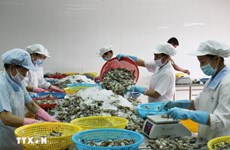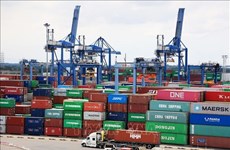Vietnam prepares for CISG membership
Vietnamese policymakers and economists have stressed the need for
Vietnam to carefully evaluate advantages and difficulties before joining
the UN Convention on Contracts for the International Sale of Goods
(CISG or the 1980 Vienna Convention).
Vietnamese policymakers and economists have stressed the need for
Vietnam to carefully evaluate advantages and difficulties before joining
the UN Convention on Contracts for the International Sale of Goods
(CISG or the 1980 Vienna Convention).
Nguyen Sinh Nhat Tan, head of the Legal Department under the Ministry of Industry and Trade, said at a November 1 seminar in Ho Chi Minh City that Vietnam has consulted the CISG in building legal corridors and laws relating to trade and investment cooperation over the past time.
He highlighted the active participation of different social sectors, especially those experienced in international trade and import-export activities in the southern region, in preparation for the country’s membership to the CISG.
Sharing Tan’s views, Dr. Nguyen Minh Hang, an advisor of the Vietnam Chamber of Commerce and Industry, said joining the convention is a topical event to Vietnam, especially in the context that the country is accelerating its international economic integration.
The CISG, together with free trade agreements and the Trans-Pacific Partnership (TPP) agreement, is expected to make it easier for Vietnam in trade and investment activities, creating a legal foundation for Vietnamese businesses to penetrate the international market, she said.
Apart from Vietnam, several other Asian countries such as the Philippines and Thailand are also stepping up efforts to join the convention, she added.
According to Nguyen Trung Nam, Executive Director of EPLegal Company, most countries that have trade ties with Vietnam have become CISG members.
Therefore, he said, the convention surely affects the country regardless of its membership.
Delegates at the seminar pointed to common legal difficulties facing Vietnamese businesses such as transactions based on relationship and belief, poor knowledge of legal issues in contract negotiations and the lack of budget for legal consultation.
Inked in Vienna, Austria in 1980, the CISG is a project of the United Nations Commission on International Trade Law (UNCITRAL). The self-executing treaty aims to reduce obstacles to international trade, particularly those associated with law issues, by creating even-handed and modern substantive rules governing the rights and obligations of parties to international sales contracts.
As of September 26, 2013, the UNCITRAL reported that 80 states have adopted the convention.-VNA
Nguyen Sinh Nhat Tan, head of the Legal Department under the Ministry of Industry and Trade, said at a November 1 seminar in Ho Chi Minh City that Vietnam has consulted the CISG in building legal corridors and laws relating to trade and investment cooperation over the past time.
He highlighted the active participation of different social sectors, especially those experienced in international trade and import-export activities in the southern region, in preparation for the country’s membership to the CISG.
Sharing Tan’s views, Dr. Nguyen Minh Hang, an advisor of the Vietnam Chamber of Commerce and Industry, said joining the convention is a topical event to Vietnam, especially in the context that the country is accelerating its international economic integration.
The CISG, together with free trade agreements and the Trans-Pacific Partnership (TPP) agreement, is expected to make it easier for Vietnam in trade and investment activities, creating a legal foundation for Vietnamese businesses to penetrate the international market, she said.
Apart from Vietnam, several other Asian countries such as the Philippines and Thailand are also stepping up efforts to join the convention, she added.
According to Nguyen Trung Nam, Executive Director of EPLegal Company, most countries that have trade ties with Vietnam have become CISG members.
Therefore, he said, the convention surely affects the country regardless of its membership.
Delegates at the seminar pointed to common legal difficulties facing Vietnamese businesses such as transactions based on relationship and belief, poor knowledge of legal issues in contract negotiations and the lack of budget for legal consultation.
Inked in Vienna, Austria in 1980, the CISG is a project of the United Nations Commission on International Trade Law (UNCITRAL). The self-executing treaty aims to reduce obstacles to international trade, particularly those associated with law issues, by creating even-handed and modern substantive rules governing the rights and obligations of parties to international sales contracts.
As of September 26, 2013, the UNCITRAL reported that 80 states have adopted the convention.-VNA













